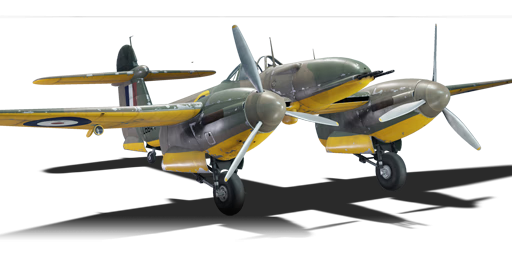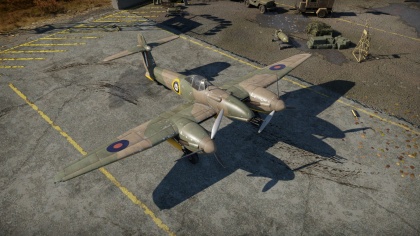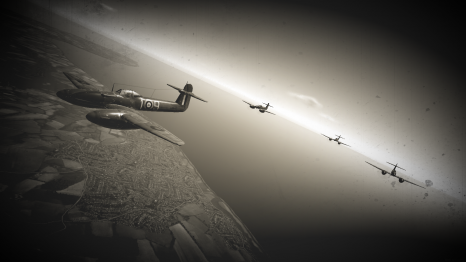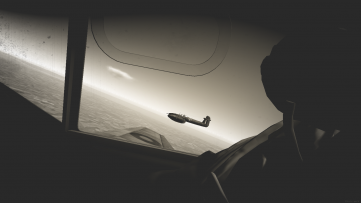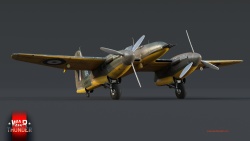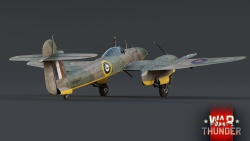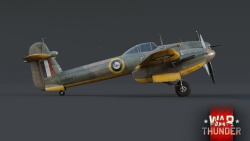Difference between revisions of "Whirlwind P.9"
m (→Offensive armament) (Tag: Visual edit) |
m (→History) (Tag: Visual edit) |
||
| Line 207: | Line 207: | ||
* Slower than average dive speed | * Slower than average dive speed | ||
* Experiences severe control stiffening at speeds above 500 km/h | * Experiences severe control stiffening at speeds above 500 km/h | ||
| + | * Vulnerable to speedy fighters | ||
== History == | == History == | ||
| − | |||
| − | == Media == | + | The prototype version of the [[Whirlwind Mk I]]. Two built, (L6844 being the in-game version). Talks for the two P.9s was placed in February 1937 which were expected to be flying mid-1938. The Whirlwind prototype, powered by the Rolls-Royce Peregrine I exhibited excellent handling characteristics and proved to be easy to fly at all speeds. After numerous modifications they set the path for the production version on 1939-1940. |
| − | <!--''Excellent additions to the article would be video guides, screenshots from the game, and photos.''--> | + | |
| + | == Media ==<!--''Excellent additions to the article would be video guides, screenshots from the game, and photos.''--> | ||
;Images | ;Images | ||
| Line 248: | Line 249: | ||
* [https://warthunder.com/en/news/6403-operation-shipyard-h-34-and-whirlwind-p-9-en Operation "Shipyard": H-34 and Whirlwind P.9] | * [https://warthunder.com/en/news/6403-operation-shipyard-h-34-and-whirlwind-p-9-en Operation "Shipyard": H-34 and Whirlwind P.9] | ||
| + | * https://en.wikipedia.org/wiki/Westland_Whirlwind_(fighter) | ||
{{AirManufacturer Westland}} | {{AirManufacturer Westland}} | ||
{{Britain strike and twin-engine fighters}} | {{Britain strike and twin-engine fighters}} | ||
{{Britain premium aircraft}} | {{Britain premium aircraft}} | ||
Revision as of 10:43, 13 January 2020
Contents
| This page is about the British gift twin-engine fighter Whirlwind P.9. For the other version, see Whirlwind Mk I. |
Description
The Whirlwind P.9 is a gift rank III British twin-engine fighter
with a battle rating of 4.3 (AB/SB) and 3.7 (RB). This aircraft was introduced in Update 1.77 "Advancing Storm" during the 2018 World War Two Chronicles. It was later re-released during Update 1.91 "Night Vision" as a reward for Operation "Shipyard". Whirlwind P.9, an experimental pre-production vehicle, is the direct ancestor of the British Whirlwind Mk I heavy fighter. Development of the aircraft began in 1937 and the aircraft in this series had plenty of time to fight against German aircraft and ships during the Battle of Britain.
General info
Flight performance
The vehicle is agile and speedy on level flight. The maneuverability is surprising, and even better with the use of flaps, making it possible to dogfight with most of the twin-engine fighters and, with skill and situational advantages, few single-engine planes as well. Just be wary of not draining all your speed while dogfighting enemies.
If played conservatively, this plane can be a tenacious opponent, especially when having an altitude advantage as this allows the Whirlwind P.9 to dive, fire, and then escape from enemies all with the same energy. This way a pilot can exploit the Whirlwind P.9's great speed to minimize the enemy's chance of getting a successful hit.
| Characteristics | |||||||
|---|---|---|---|---|---|---|---|
| Stock | |||||||
| Max Speed (km/h at 4,877 m) |
Max altitude (meters) |
Turn time (seconds) |
Rate of climb (meters/second) |
Take-off run (meters) | |||
| AB | RB | AB | RB | AB | RB | ||
| ??? | ??? | 9144 | ??.? | ??.? | ??.? | ??.? | 650 |
| Upgraded | |||||||
| Max Speed (km/h at 4,877 m) |
Max altitude (meters) |
Turn time (seconds) |
Rate of climb (meters/second) |
Take-off run (meters) | |||
| AB | RB | AB | RB | AB | RB | ||
| 602 | 580 | 9144 | 21.9 | 23.0 | 18.2 | 15 | 650 |
Details
| Features | ||||
|---|---|---|---|---|
| Combat flaps | Take-off flaps | Landing flaps | Air brakes | Arrestor gear |
| ✓ | ✓ | ✓ | X | X |
| Limits | ||||
|---|---|---|---|---|
| Wing-break speed (km/h) |
Gear limit (km/h) |
Combat flaps (km/h) |
Max Static G | |
| + | - | |||
| 490 | ~10 | ~5 | ||
| Optimal velocities | |||
|---|---|---|---|
| Ailerons (km/h) |
Rudder (km/h) |
Elevators (km/h) |
Radiator (km/h) |
| < 420 | < 420 | < 450 | > 324 |
| Compressor (RB/SB) | ||
|---|---|---|
| Setting 1 | ||
| Optimal altitude | 100% Engine power | WEP Engine power |
| 4,575 m | 885 hp | 947 hp |
Survivability and armour
Packed with wide 2 layers of armour (both of 9mm) in front of the pilot, covering the 20 mm cannons and the engine. The bulletproof glass (60mm) will also be helpful in head-ons or when hunting turret defended planes.
The Whirlwind P.9 has a vulnerable tail as the elevator and ailerons generally will be blown off if the enemy gets to blaze you from behind or wins in a head-on. Hence you should avoid be caught off guard as it will much likely end your flight capacities.
Armaments
Offensive armament
The Whirlwind P.9 is armed with:
- 4 x 20 mm Hispano Mk.I cannons, nose-mounted (121 rpg = 484 total)
The four cannons make the Whirlwind P.9 well armed for head-on engagements or Boom and Zoom tactics, as the four nose-mounted cannons will shred through everything, specially with the Ground Targets belt due to its AP ammunition.
Although gun convergence its a personal choice, it's suggested to set the gun convergence of the nose mounted cannons to 600m as the 4 cannons are lined horizontally. This allows to score great shots at the moment of diving to an enemy without getting to close or too far away. Just enough to aline with the targets flight trajectory and release a shot burst. If engaged with them in dogfight just keep in mind this distance.
Usage in battles
The Whirlwind P.9 should be used similarly to other heavy fighters. The flight characteristics are very similar to the Whirlwind Mk I with the main difference being that the Whirlwind P.9 has more than double the ammunition count.
The P.9 is very effective in a boom and zoom role due to its good climb rate, and powerful armament. However, the relatively low wing break speed in RB does limit you in this role. The Whirlwind P.9 has a good turn rate for a heavy fighter, but will be easily out turned by single-engined fighters. The use of combat flaps will help to balance out this disadvantage. Care must be taken when using the combat flaps, however, as the are prone to snapping off at a relatively low speed.
At this battle-rating you will see many BV 238s and Me 264s. Heading on these bombers will usually guarantee you a kill, but you still need to be careful of the powerful defensive armament of them.
Manual Engine Control
| MEC elements | ||||||
|---|---|---|---|---|---|---|
| Mixer | Pitch | Radiator | Supercharger | Turbocharger | ||
| Oil | Water | Type | ||||
| Controllable | Controllable Not auto controlled |
Controllable Auto control available |
Controllable Auto control available |
Separate | Not controllable 1 gear |
Not controllable |
Modules
| Tier | Flight performance | Survivability | Weaponry | |
|---|---|---|---|---|
| I | Fuselage repair | Radiator | Offensive 20 mm | |
| II | Compressor | Airframe | ||
| III | Wings repair | Engine | New 20 mm cannons | |
| IV | Engine injection | Cover | ||
As a premium vehicle, all modifications are already unlocked when the vehicle is acquired.
Pros and cons
Pros:
- Devastating armament in 4 x nose-mounted 20 mm Hispano cannons
- Closely packed nose-mounted guns are great for head-on attacks
- Good turn rate for a twin-engined fighter
- Decent manoeuvrability for a heavy fighter
- Decent roll rate for a heavy fighter
- Deadly with the Ground Targets belt
Cons:
- Ammo can deplete pretty quickly (though still double that of the Whirlwind Mk I)
- Slower than average dive speed
- Experiences severe control stiffening at speeds above 500 km/h
- Vulnerable to speedy fighters
History
The prototype version of the Whirlwind Mk I. Two built, (L6844 being the in-game version). Talks for the two P.9s was placed in February 1937 which were expected to be flying mid-1938. The Whirlwind prototype, powered by the Rolls-Royce Peregrine I exhibited excellent handling characteristics and proved to be easy to fly at all speeds. After numerous modifications they set the path for the production version on 1939-1940.
Media
- Images
- Videos
See also
- Related development
- Westland Whirlwind Mk I
- Aircraft of comparable role, configuration and era
- Grumman XF5F Skyrocket
- Grumman XP-50
- Kawasaki Ki-45-II
- Lockheed P-38 Lightning
- Yakolev Yak-2 KABB
External links
- Operation "Shipyard": H-34 and Whirlwind P.9
- https://en.wikipedia.org/wiki/Westland_Whirlwind_(fighter)
| Westland Aircraft Limited | |
|---|---|
| Aircraft | |
| Fighters | Whirlwind Mk I · Whirlwind P.9 |
| Turboprop | Wyvern S4 |
| Helicopters* | |
| Attack | AH Mk.1 Apache** |
| Utility | Wessex HU Mk.5 · Scout AH.Mk.1 · Wasp HAS.Mk.1 · Lynx AH.Mk.1 · G-LYNX |
| *After World War II, Westland Aircraft focused on building helicopters and changed its name to Westland Helicopters. | |
| **Licensed AH-64D | |
| See Also | Boeing Aircraft |
| Britain strike aircraft | |
|---|---|
| Blackburn | Firebrand TF Mk IV · Firecrest |
| Bristol | Beaufighter Mk I (40-mm) · Beaufighter Mk VIc · Beaufighter Mk X · Beaufighter Mk 21 |
| CAC | ▄Wirraway |
| Fairey | Firefly F Mk I · Firefly FR Mk V |
| de Havilland | Mosquito FB Mk VI · Mosquito FB Mk XVIII |
| Hawker | Hurricane Mk IV · Tempest Mk V (Vickers P) |
| Westland | Wyvern S4 |
| Britain premium aircraft | |
|---|---|
| Fighters | Tuck's Gladiator Mk II · ▄Boomerang Mk I · ▄Boomerang Mk II · ▄D.520 |
| ▄Martlet Mk IV · ▄Corsair F Mk II · ▄Hellcat Mk II · ▄Thunderbolt Mk.1 · ▄Mustang Mk IA | |
| Hurricane Mk.I/L FAA M · Spitfire Mk.IIa Venture I · Spitfire F Mk IXc · Plagis' Spitfire LF Mk IXc · Spitfire F Mk XIVc · Prendergast's Spitfire FR Mk XIVe | |
| Typhoon Mk Ib · MB.5 | |
| Twin-engine fighters | Hornet Mk.I · Whirlwind P.9 |
| Jet fighters | Attacker FB.2 · Hunter FGA.9 · Lightning F.53 · Meteor F Mk.8 Reaper · Sea Vixen F.A.W. Mk.2 · F-4J(UK) Phantom II · ▄MiG-21 Bison |
| Strike aircraft | ▄Wirraway · Beaufighter Mk I (40-mm) · Wyvern S4 |
| Harrier GR.1 · Strikemaster Mk.88 | |
| Bombers | ▄Avenger Mk II · ▄Boston Mk I · ▄Catalina Mk IIIa · ▄DB-7 · ▄Havoc Mk I · ▄Hudson Mk V · Swordfish Mk II |


